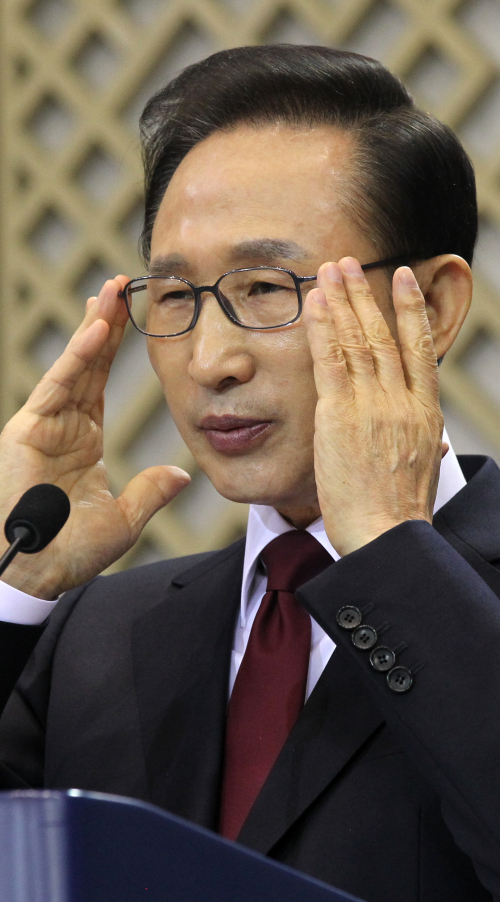President vows to complete military reform, reinforce Dokdo sovereignty
President Lee Myung-bak on Friday apologized for failing to keep his election pledge to build a new international airport in the southeastern part of the country and said that the high-speed KTX train network would help reduce inconvenience for people traveling abroad.
“I am sorry that (the government) failed to keep the pledge on the airport in the southeastern region, especially for the people of Yeongnam (the southeastern Gyeongsang provinces),” Lee said in a televised press conference.
“But as a president who is responsible for the nation’s budget, I cannot but think about the burden an economically nonviable project would pose on the country and the region.”
Stressing that the government’s interest in developing Yeongnam remains unchanged, Lee said that the improvement of the high-speed KTX train network would result in further decline of demand for domestic air travel at the existing Gimhae airport near Busan and therefore make room for more international flights and foreign airliners in Gimhae.
“From Busan airport, 3 million people travel abroad annually and 5 million use domestic flights,” Lee said at the end of his press conference.
Referring to how an increasing number of people choose the KTX over planes to save time and money, Lee said further technological development of the KTX would shorten the travel time between Seoul and Busan to less than two hours.
“Once the domestic flights move out of the Busan airport, we could use the extra space to bring in foreign airliners.”
In addition to a few Japanese and Chinese airlines, Delta Airlines and Lufthansa Airlines are the only foreign air carriers operating long-distance routes to and from Gimhae.
Park Geun-hye, currently the ruling Grand National Party’s strongest presidential hopeful, on Thursday countered the Lee administration’s decision to give up the airport, saying Korea should keep pushing for the project. She made the remarks during her visit to Daegu, her home turf.
Lee said he understands that she “has no choice but to say so in her hometown, but I’m sure she would understand that as a president, I had no choice either” but to ditch the economically nonviable airport.
 |
President Lee Myung-bak |
“Therefore, I don’t think it is right for the media to take the issue (the conflict between Lee and his political archrival Park) too seriously,” he said.
Lee also ruled out the possibility of leaving the GNP. Several GNP lawmakers with constituencies in the southeast called on Lee to leave the party.
The GNP is bracing itself for showdowns with the main opposition Democratic Party in the April 27 by-elections as well as the general and presidential elections next year.
Lee also reiterated his strong determination for military reform during the press conference, saying he expects it to be “successfully completed within this year.”
“If the military cannot reform itself after (North Korea’s) attacks on the Cheonan and Yeonpyeong Island, we would have no chance,” Lee said.
Lee warned against several retired generals’ complaints over the Defense Ministry’s “Defense Reform 307 Plan” by saying that everyone should “drop their selfish thoughts” in taking steps to enhance military “jointness,” or combined capabilities of the nation’s armed forces in dealing with the North’s asymmetrical military threats.
“The Army, Navy, Air Force and Marines each have their own strengths, but what is important is their jointness in actual combat situations,” Lee said.
As an example of lack of military jointness, the president mentioned the insufficient counterattack using the Marines’ K-9 self-propelled howitzers against the North’s shelling on Yeonpyeong Island in November.
An F-15K fighter jet with air-to-land missiles had set out then, but failed to carry out a counterattack as the South’s Marines had already stopped firing back when the jet arrived near the island.
Lee also pledged Friday to reinforce South Korea’s effective sovereign control of the Dokdo islets against Japan’s renewed territorial claim, emphasizing that the rocky outcropping in the East Sea is “our territory” under any circumstances.
Lee’s strongly worded comments were his first official response to Japan’s latest endorsement of middle school textbooks that claimed the Dokdo islets, which lie in the East Sea between the two countries, as its territory.
By Kim So-hyun (
sophie@heraldcorp.com)








![[Today’s K-pop] Blackpink’s Jennie, Lisa invited to Coachella as solo acts](http://res.heraldm.com/phpwas/restmb_idxmake.php?idx=644&simg=/content/image/2024/11/21/20241121050099_0.jpg)